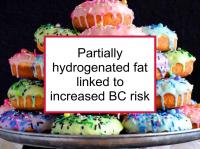A new study has reported that consuming partially hydrogenated oils is associated with higher risks of premenopausal breast cancer, prostate cancer, and colon cancer. The study was designed to investigate the associations between dietary trans fatty acid and risk of selected cancers.
Trans fats are produced by adding hydrogen atoms to unsaturated fats. Such hydrogenation stabilizes vegetable oils, preventing them from becoming rancid and keeping them solid at room temperature. Food ingredients labeled as partially hydrogenated oils are trans fats. Commercially fried foods, high-fat baked goods (donuts, cookies, crackers), and margarines all can contain high levels of trans fats. (Conjugated linoleic acid (CLA) is a naturally occurring trans fat found in beef and dairy foods. It's influence on cancer risk is unclear.)
Study design
To conduct the study, questionnaires were mailed between 1994 and 1997 to people in eight Canadian provinces with various types of cancer. The study included the following cancers: bladder (1029 cases); brain (1009); breast (2362); colon (1727); kidney (1345); lung (3341); ovary (442); pancreas (628); prostate (1799); rectum (1447); stomach (1182); and testis (686); as well as 1069 leukemias; and 1069 leukemias. Also included in the study were 5039 cancer-free people who acted as controls. Dietary habits and nutrition intake were assessed using a food frequency questionnaire, which provided information on eating habits two years prior to the study.
Study results
Dietary trans fatty acid intake was found to be associated with increased risk of premenopausal breast cancer, prostate cancer, and colon cancer. Premenopausal women with the highest levels of trans fat consumption (the highest quartile of intake) had 1.6 times the risk of premenopausal breast cancer as women in the lowest quartile of intake. A borderline association was also found for pancreatic cancer. No significant association was observed for the other cancers.
The authors conclude that the findings provide evidence that high dietary trans fatty acid is associated with an increased risk of several cancers; a diet low in trans fats may play a role in preventing these cancers.
